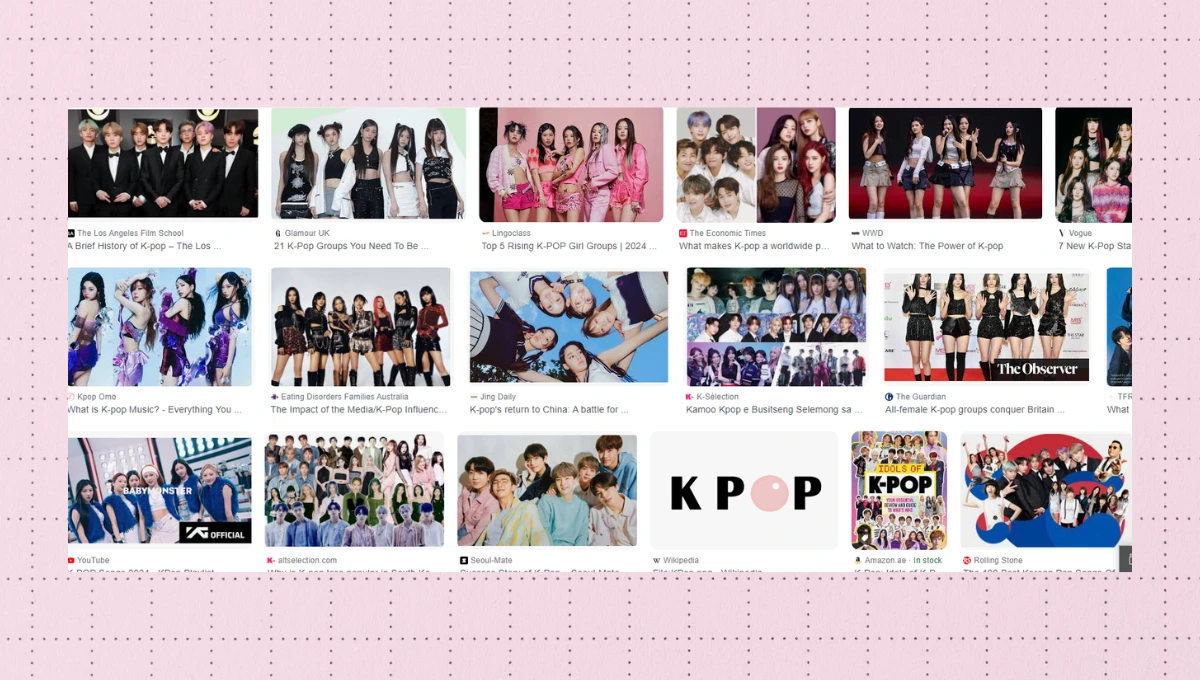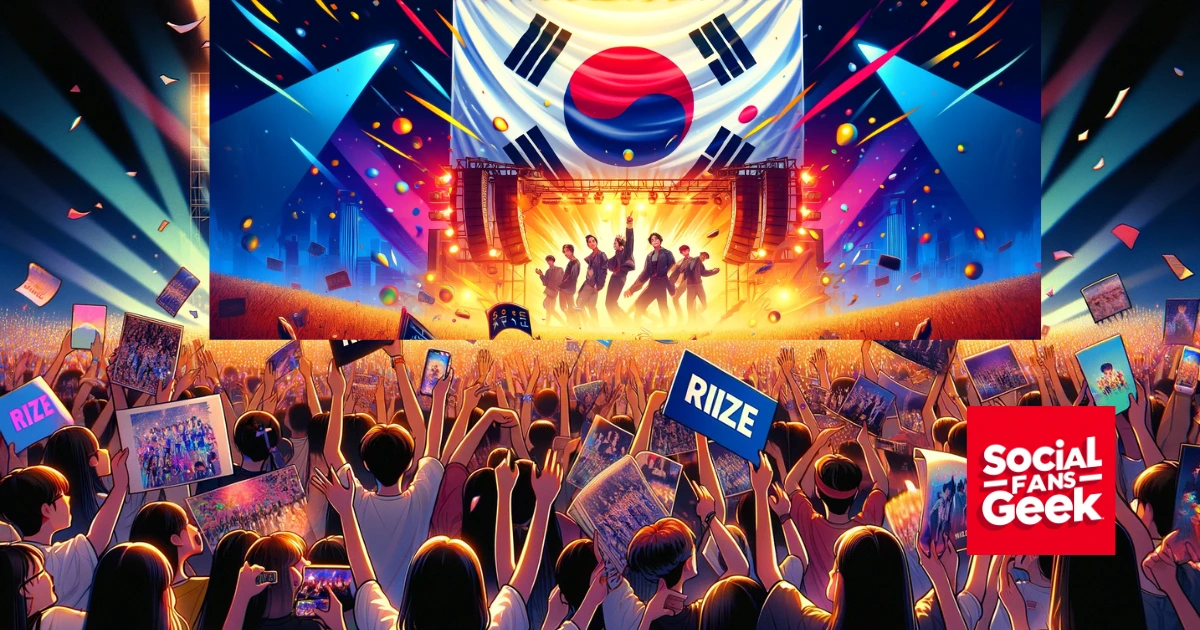K-pop Fans Demographics, Global Popularity, and Key Statistics

How Many K-pop Fans Are There in the World 2024
As of 2024, the global K-pop fan base is estimated to exceed 150 million individuals. This impressive figure reflects the genre's widespread appeal and the dedicated efforts of fan communities around the world. The surge in K-pop's popularity can be attributed to the international success of groups like BTS, BLACKPINK, and TWICE, who have managed to captivate audiences across diverse cultures and languages. Social media platforms play a crucial role in connecting these fans, creating a robust and interactive global network that supports and promotes K-pop artists (source: KOFICE).
Percentage of K-pop Fans in the World
The percentage of K-pop fans in the world varies by region, but it is estimated that about 2% of the global population identifies as K-pop fans. This percentage is particularly high in countries with a strong entertainment culture and robust internet connectivity. For instance, in countries like South Korea, Japan, and the United States, the concentration of K-pop fans is significantly higher. This statistic underscores the genre's ability to transcend geographical boundaries and cultural differences, making it a truly global phenomenon (source: Billboard).
K-pop Popularity by Country
K-pop's popularity by country reveals fascinating trends and patterns. South Korea, unsurprisingly, remains the heart of K-pop culture, with idols often achieving superstar status domestically. However, countries such as the United States, Brazil, and Japan have emerged as major hubs for K-pop fandom. In the United States, K-pop concerts and fan events frequently sell out, demonstrating the genre's strong foothold. Brazil hosts some of the most passionate K-pop fans, evident in their enthusiastic participation in online campaigns and social media trends. Japan, with its long history of embracing various aspects of Korean culture, remains one of the largest markets for K-pop outside of South Korea (source: KOFICE).
K-pop Popularity Statistics
K-pop popularity statistics highlight the genre's explosive growth over the past decade. According to a recent report, K-pop album sales and streaming numbers have seen exponential increases, with groups like BTS and BLACKPINK breaking numerous records on platforms like Billboard and YouTube. For instance, BTS's album "Map of the Soul: 7" sold over 4 million copies worldwide, and BLACKPINK's music videos regularly amass over a billion views. These statistics not only emphasize the commercial success of K-pop but also its pervasive cultural impact (source: Billboard).
How Many K-pop in the World
When discussing how many K-pop groups exist in the world, the number is continually growing. As of 2024, there are hundreds of active K-pop groups, ranging from well-established acts to newly debuted ensembles. The competitive nature of the K-pop industry in South Korea leads to a constant influx of new talent, with entertainment companies regularly launching new groups to capture the public's attention. This dynamic environment ensures that K-pop remains fresh and exciting, with a diverse array of artists contributing to its vibrant scene (source: KOFICE).
K-pop Fan Demographics
K-pop fan demographics are remarkably diverse, encompassing a wide range of ages, genders, and cultural backgrounds. While traditionally the fan base has been dominated by teenagers and young adults, there is a growing number of older fans who appreciate the genre's musical and cultural richness. Additionally, K-pop appeals to both male and female fans, though the majority tends to be female. Geographically, K-pop fans are spread across continents, with significant concentrations in Asia, North America, and Latin America. This diversity is a testament to K-pop's universal appeal and its ability to connect with people from all walks of life (source: Billboard).
How Popular is K-pop in Korea
K-pop's popularity in Korea is nothing short of a cultural phenomenon. In South Korea, K-pop idols are revered, often achieving a level of celebrity comparable to that of Hollywood stars. The genre dominates the Korean music charts, and K-pop idols frequently appear on television, in advertisements, and at public events. The K-pop industry is also a significant driver of South Korea's economy, contributing billions of dollars annually. K-pop's influence extends beyond music, affecting fashion, beauty, and lifestyle trends within the country (source: KOFICE).
K-pop Fans Are Called
K-pop fans are collectively known as "K-pop stans," a term derived from the combination of "stalker" and "fan," though it carries a positive connotation of dedicated support rather than any negative implications. Each K-pop group has its own fandom name; for example, BTS fans are called "ARMY," BLACKPINK fans are known as "BLINK," and TWICE fans are referred to as "ONCE." These fandoms are known for their passionate support, organizing large-scale events, streaming parties, and social media campaigns to promote their favorite artists. The sense of community among K-pop fans is strong, often transcending national and cultural barriers to unite fans worldwide in their shared love for K-pop (source: Billboard).
K-pop, a genre originating from South Korea, has transcended cultural and linguistic barriers to become a global phenomenon. Its unique blend of catchy melodies, intricate choreography, and visually stunning music videos has garnered a diverse and dedicated fanbase worldwide. This article delves into the latest demographics of K-pop fans, explores its global popularity, and highlights key statistics that underscore its significant impact on the global music industry.
Introduction
Over the past decade, K-pop has evolved from a regional music genre to a global powerhouse, influencing music trends, fashion, and even international relations. The rise of groups like BTS, BLACKPINK, and EXO has not only propelled K-pop into mainstream consciousness but has also created a vibrant and expansive global community of fans. Understanding the demographics, popularity trends, and key statistics of K-pop fans provides valuable insights into its sustained growth and cultural significance.
K-pop Fan Demographics in 2025
Age Distribution
K-pop appeals to a broad age range, but recent data indicates a significant concentration among younger audiences:
- Gen Z (18-24 years): Approximately 45% of K-pop fans fall within this age group, driven by social media engagement and the genre's alignment with youth culture.
- Millennials (25-40 years): Representing around 35% of the fanbase, millennials engage with K-pop through nostalgia and sustained interest in the genre's evolution.
- Gen X and Older (41+ years): Comprising about 20%, this segment includes parents of younger fans and enthusiasts who appreciate K-pop's musicality and production quality.
Gender Breakdown
K-pop boasts a relatively balanced gender distribution, though certain trends suggest variations based on specific groups and activities:
- Female Fans: Approximately 55% of the K-pop audience identifies as female, driven by the genre's emphasis on aesthetics, storytelling, and emotional connection.
- Male Fans: About 45% of fans are male, often attracted to the high-energy performances, musical complexity, and global appeal of K-pop acts.
Kpop Geographical Insights
K-pop's global reach is evident in its diverse fanbase spread across various regions:
- Asia-Pacific: The largest concentration of K-pop fans resides in countries like Japan, China, Southeast Asia, and India, where cultural proximity and media accessibility play significant roles.
- North America: The United States and Canada have seen exponential growth in K-pop popularity, fueled by digital platforms and mainstream media coverage.
- Europe: Countries such as the United Kingdom, Germany, and France have vibrant K-pop communities, supported by international tours and localized fan events.
- Latin America: Nations like Brazil, Mexico, and Chile have rapidly emerging K-pop scenes, characterized by enthusiastic fan engagement and local media integration.
- Middle East and Africa: While smaller in comparison, these regions are experiencing gradual growth in K-pop fandom, driven by increasing internet penetration and cultural exchange initiatives.
Global Popularity of K-pop
Streaming and Digital Consumption
The advent of digital platforms has been pivotal in K-pop's global expansion:
- YouTube: K-pop music videos regularly accumulate hundreds of millions of views within days of release. For instance, BLACKPINK's "Kill This Love" surpassed 600 million views within six months.
- Spotify: K-pop tracks consistently feature on global playlists, with BTS's "Dynamite" becoming Spotify's most-streamed song in multiple countries.
- Apple Music: Exclusive releases and curated playlists have further cemented K-pop's presence on major streaming services.
Social Media Influence
Social media platforms play a crucial role in fostering fan engagement and disseminating K-pop content:
- Instagram: K-pop idols collectively have over 200 million followers, using the platform to share updates, interact with fans, and promote new releases.
- Twitter: Hashtags related to K-pop trends and events often trend globally, facilitating real-time conversations and community building.
- TikTok: Short-form videos featuring K-pop choreography and challenges have gone viral, introducing the genre to younger and more diverse audiences.
- Weibo: In China, Weibo serves as a primary platform for K-pop promotion, despite regulatory challenges, maintaining a strong fan presence.
Concerts and Live Events
Live performances remain a cornerstone of K-pop's appeal, both in physical and virtual formats:
- International Tours: Groups like BTS and BLACKPINK consistently sell out large venues worldwide, from the Staples Center in Los Angeles to the Olympic Stadium in London.
- Virtual Concerts: In response to the COVID-19 pandemic, many K-pop groups have embraced virtual concerts, allowing global fans to participate in real-time events from their homes.
- Fan Meets and Fan Signings: These intimate events foster deeper connections between idols and fans, contributing to the genre's loyal fanbase.
Key Statistics
Fanbase Size and Growth
K-pop's fanbase continues to expand at an impressive rate:
- Global K-pop Fans: As of 2024, it is estimated that there are over 800 million K-pop fans worldwide, with significant growth observed in emerging markets.
- Online Communities: Platforms like Reddit, Discord, and dedicated fan websites host millions of active users discussing and promoting K-pop content daily.
Sales Figures
K-pop's commercial success is reflected in its sales across various categories:
- Album Sales: BTS's "Map of the Soul: 7" sold over 4 million copies worldwide, setting new records for physical album sales in the digital age.
- Digital Downloads: BLACKPINK's singles consistently top global charts, with "How You Like That" achieving multi-million download milestones.
- Merchandise Sales: Official merchandise from K-pop groups generates significant revenue, with fans purchasing everything from apparel to exclusive collectibles.
Awards and Recognitions
K-pop has garnered numerous accolades, highlighting its global impact:
- Billboard Music Awards: BTS and BLACKPINK have won multiple awards, including Top Social Artist and Top Streaming Song.
- MTV Video Music Awards: K-pop acts have been recognized for their innovative music videos and global influence.
- Grammys: While still emerging in this arena, K-pop artists have received nominations and increased consideration from the global music community.
Economic Contributions
K-pop significantly contributes to the global economy through various channels:
- Tourism: International fans often travel to South Korea to attend concerts, visit entertainment agencies, and participate in cultural experiences.
- Fashion and Beauty: K-pop trends influence global fashion and beauty industries, with collaborations between idols and major brands.
- Technology: The integration of advanced technologies in K-pop productions, such as augmented reality and interactive fan experiences, drives innovation and economic growth.
Trends Shaping K-pop’s Future
Virtual and Augmented Reality Concerts
The integration of virtual and augmented reality is transforming the concert experience:
- Immersive Experiences: Fans can attend virtual concerts with augmented reality features, enhancing engagement and accessibility.
- Global Participation: Virtual platforms allow fans from around the world to experience live performances simultaneously, breaking geographical barriers.
Cross-Cultural Collaborations
Collaborations with international artists are expanding K-pop's reach and diversity:
- Genre Fusion: Partnerships with artists from different genres, such as hip-hop, EDM, and pop, are creating innovative and diverse music offerings.
- Cultural Exchange: Collaborative projects foster cultural exchange, introducing K-pop to new audiences and blending musical traditions.
Expansion into New Markets
K-pop continues to penetrate untapped markets, driven by strategic marketing and localized content:
- Localized Content: Creating content tailored to specific regions, including translations and culturally relevant themes, enhances relatability and appeal.
- Strategic Partnerships: Collaborations with local media and brands facilitate deeper market penetration and fan engagement.
Challenges and Opportunities
Sustainability of Growth
Maintaining sustained growth poses challenges as K-pop continues to scale:
- Market Saturation: With an increasing number of groups debuting each year, maintaining uniqueness and quality is essential for long-term success.
- Fan Fatigue: Balancing frequent comebacks and extensive promotions without overwhelming fans is crucial for sustained engagement.
Cultural Appropriation and Representation
Ensuring cultural sensitivity and appropriate representation remains a critical issue:
- Authenticity: Balancing global appeal with authentic cultural expression is vital to avoid perceptions of cultural appropriation.
- Diversity: Promoting diversity within K-pop groups and content can enhance inclusivity and global resonance.
Technological Innovations
Leveraging technological advancements presents both opportunities and challenges:
- Innovation: Embracing new technologies can enhance fan experiences and streamline content delivery.
- Adaptation: Staying abreast of technological trends and adapting to changing consumer preferences is essential for continued relevance.
K-pop's journey from a regional genre to a global sensation is a testament to its dynamic appeal, strategic marketing, and dedicated fanbase. As it continues to evolve, K-pop is poised to further solidify its position in the global music landscape, driven by innovative trends, cross-cultural collaborations, and unwavering fan support. Understanding the demographics, popularity, and key statistics of K-pop fans not only highlights its current impact but also sheds light on its promising future trajectory.
References
- Korean Foundation for International Culture Exchange (KOFICE). (2023). K-pop's Global Impact Report. Retrieved from https://www.kofice.or.kr
- Statista. (2023). Global K-pop Market Size and Forecast. Retrieved from https://www.statista.com
- Billboard. (2023). K-pop Artists' Achievements at Global Music Awards. Retrieved from https://www.billboard.com
- Spotify. (2023). Most Streamed K-pop Songs and Artists. Retrieved from https://open.spotify.com
- YouTube. (2023). K-pop Music Videos Viewership Statistics. Retrieved from https://www.youtube.com
- Pew Research Center. (2023). Demographics of K-pop Fans Worldwide. Retrieved from https://www.pewresearch.org
- International Federation of the Phonographic Industry (IFPI). (2023). Global Music Report. Retrieved from https://www.ifpi.org
- Forbes. (2023). Economic Contributions of K-pop to Global Markets. Retrieved from https://www.forbes.com
- MTV News. (2023). K-pop's Rise in Global Music Awards. Retrieved from https://www.mtv.com/news
- Nielsen Music. (2023). Streaming Trends and K-pop Popularity. Retrieved from https://www.nielsen.com

